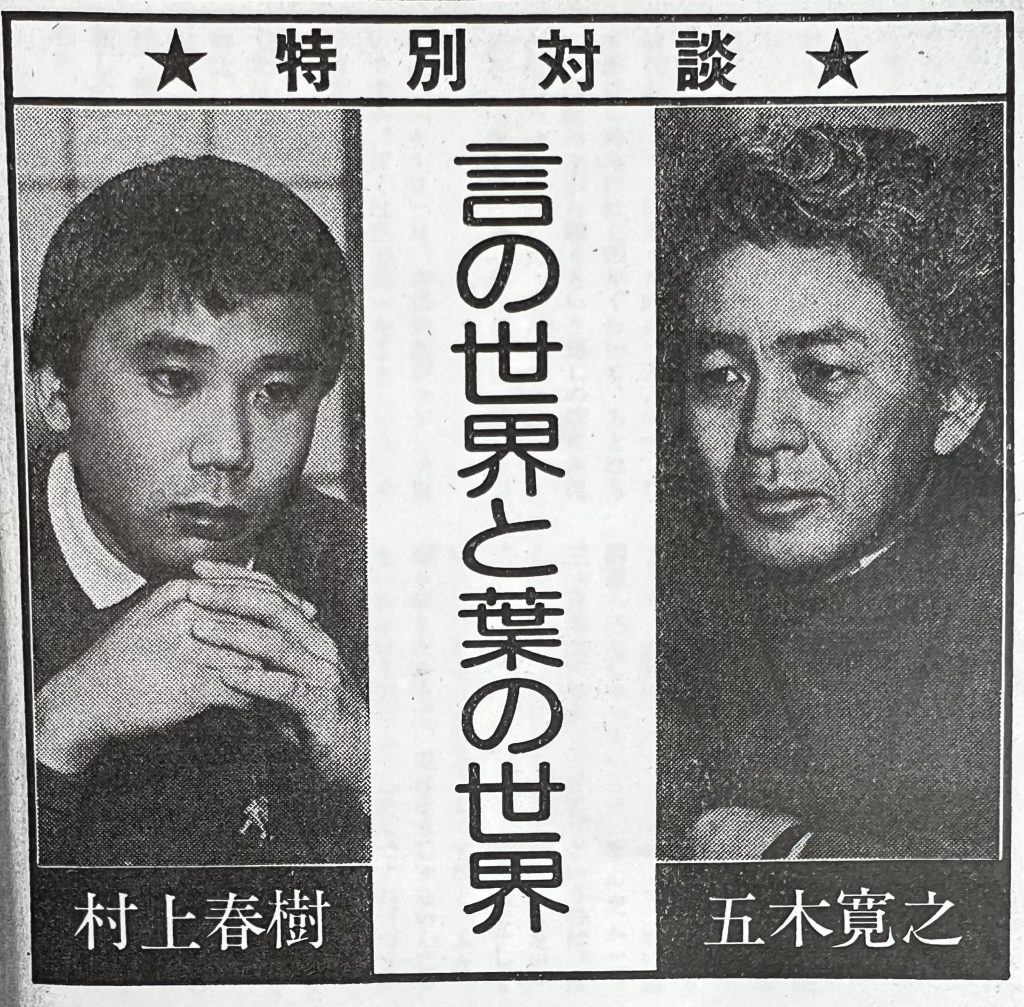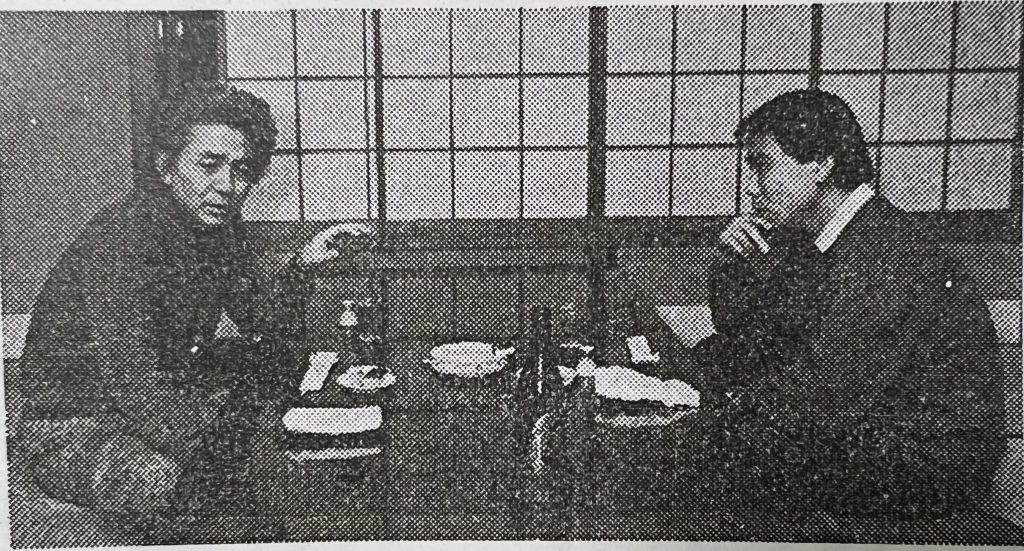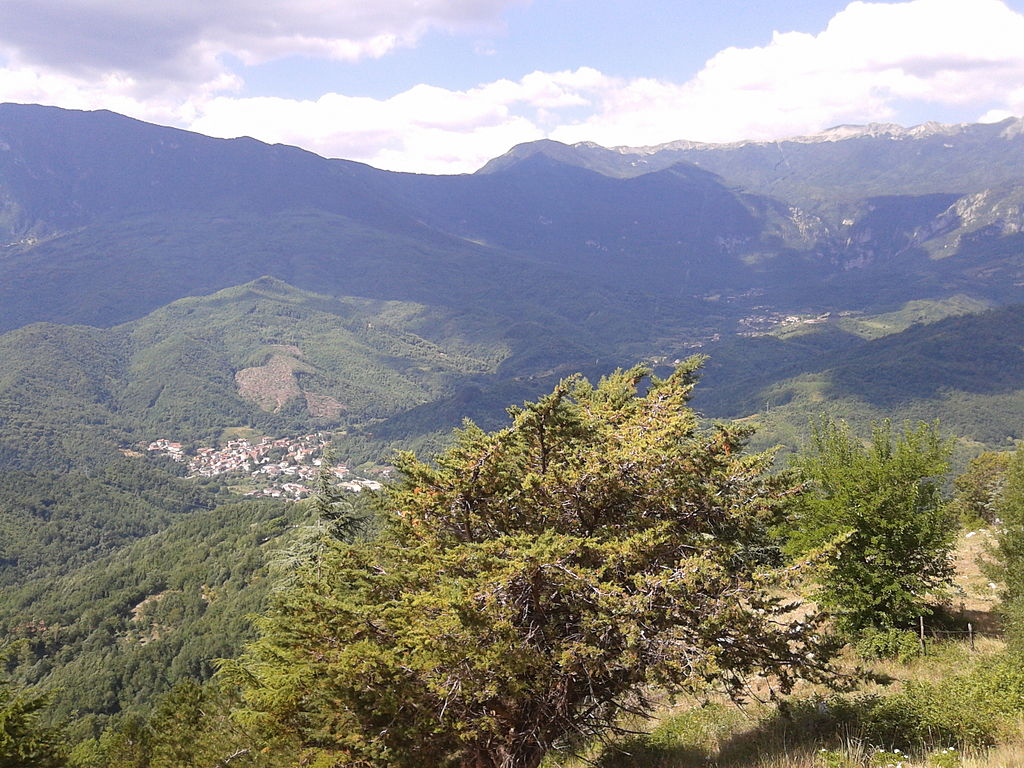Year 1: Boobs, The Wind, Baseball, Lederhosen, Eels, Monkeys, and Doves
Year 2: Hotel Lobby Oysters, Condoms, Spinning Around and Around, 街・町, The Town and Its Uncertain Wall, A Short Piece on the Elephant that Crushes Heineken Cans
Year 3: “The Town and Its Uncertain Wall” – Words and Weirs, The Library, Old Dreams, Saying Goodbye, Lastly
Year 4: More Drawers, Phone Calls, Metaphors, Eight-year-olds, dude, Ushikawa, Last Line
Year 5: Jurassic Sapporo, Gerry Mulligan, All Growns Up, Dance, Mountain Climbing
Year 6: Sex With Fat Women, Coffee With the Colonel, The Librarian, Old Man, Watermelons
Year 7: Warmth, Rebirth, Wasteland, Hard-ons, Seventeen, Embrace
Year 8: Pigeon, Edits, Magazines, Awkwardness, Back Issues
Year 9: Water, Snæfellsnes, Cannonball, Distant Drumming
Year 10: Vermonters, Wandering and Belonging, Peter Cat, Sushi Counter, Murakami Fucks First
Year 11: Embers, Escape, Window Seats, The End of the World
Year 12: Distant Drums, Exhaustion, Kiss, Lack of Pretense, Rotemburo
Year 13: Murakami Preparedness, Pacing Norwegian Wood, Character Studies and Murakami’s Financial Situation, Mental Retreat, Writing is Hard
Year 14: Prostitutes and Novelists, Villa Tre Colli and Norwegian Wood, Surge of Death, On the Road to Meta, Unbelievable
Year 15: Baseball on TV, Kindness, Murakami in the Asahi Shimbun – 日記から – 1982, The Mythology of 1981, Winning and Losing
Year 16: The Closet Massacre, Booze Bus, Old Shoes
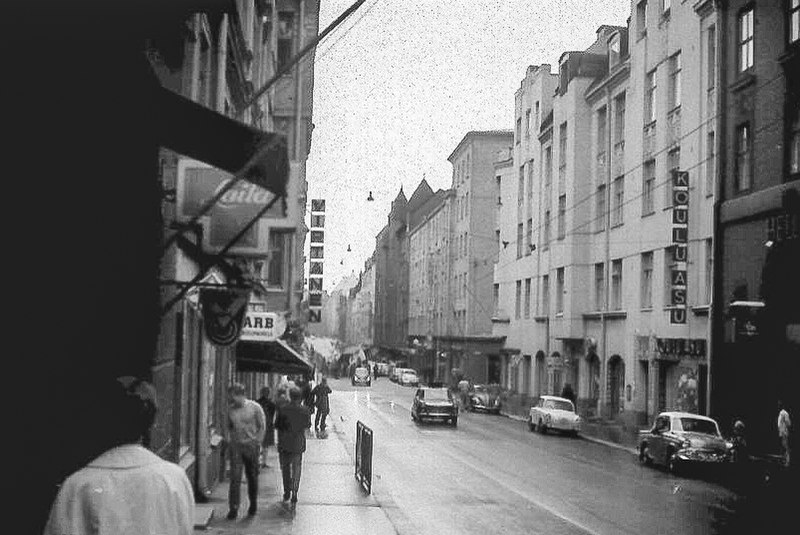
Helsinki in 1968, right around when Murakami would have been at Waseda.
Week 4 in Murakami Fest 2023. We’re looking at his travel memoir Distant Drums (遠い太鼓).
Murakami divides the book into another section here titled “1987, Summer to Fall” (1987年、夏から秋), and the first subsection is “Helsinki” (ヘルシンキ). The Murakamis spend five nights in Helsinki en route back to Rome. It’s a chilly September, 8C when they land, equivalent to the end of November in Tokyo.
Murakami notes that the food is plentiful but limited in the winter when the selection drops off. He decides to skip a Bob Dylan-Tom Petty concert because of the weather (which I bet he regrets now!) and makes the funny comment “that guy’s already pretty old” (あの人ももうけっこうな歳だし) (276) when he notes that he’s worried about Bob being out in the weather. Instead he attends the symphony and gives his thoughts on the music choices.
The most interesting part of this section, however, is the very beginning. The Murakamis head back to Tokyo for the summer, returning to Japan for the first time in a year. I thought that he noted they were there for three months, but now I can’t find that passage. He notes that they return in 初夏 (early summer) and then are off to Helsinki in early September. While in Japan, he’s taking care of all the writing and translation work he’s done. Here’s what he has to say:
In early summer 1987, we returned to Japan for the first time in almost a year. I had to go for the galleys of Norwegian Wood. Even the very doubtful Yoko Kinoshita at Kodansha (although she herself insists she isn’t) said, “The book was really interesting.” Well, that’s good to hear. I’d been worried they’d say something like, “What the hell is this? This is just long.” I also checked the translations of Paul Theroux’s World’s End and [C.D.B.] Bryant’s The Great Dethriffe I did while I was on the Continent (which feels like a very old phrase). Essentially I was handling a year’s worth of publications. Although it’s my job, it was tough with all the things I had do. It ended up eating up the whole summer.
We set the design for three books, I went back and forth at meetings with editors over small details, and once we’d arranged everything so that all that remained was to print them, I left Japan again. I felt like a housewife who cooks and freezes a week’s worth of food in one go. It was a brief trip home, but there was a lot that wore me out. My brain got all wrapped up around itself getting together with people and with the endless, unrelenting appearance of various administrative work. It’s tough that we won’t be able to have good Japanese food for a while, but I guess there’s nothing we can do about it.
一九八七年の初夏にほぼ一年振りに日本に戻った。『ノルウェイの森』のゲラに手を入れるためだ。猜疑心の強い講談社の木下陽子さん(本人はそんなことないと主張するけれど)も「うん、とても面白かった」と言ってくれた。まあ良かった。「何ですかこれ、ただ単に長いだけじゃないですか」なんて言われたらどうしようと思って心配していたのだ。それから滞欧中(というのもなんとなく古い言葉だけど)に仕上げたポール・ゼローの『ワールズ・エンド』とブラインの『偉大なるデスリフ』の翻訳ゲラもチェックする。一年ぶんの出版物の仕込みをまとめてやっちゃうわけである。これが仕事とはいえ、やることがいっぱいあって大変である。夏がまるまる潰れてしまった。
三冊ぶんの本の装幀を決め、編集者とあれこれいろんな細かい打ち合わせをして、これでもうあとは印刷するだけというところまできちんと手筈を整えてから、また日本を出る。なんだか一週間ぶんの料理を一度に作って冷凍する主婦みたいである。日本を出たのは九月始め。短い帰国だったけれど、結構疲れることが多かった。人とのつきあいとか、いもづる式にあとからあとから出てくる事務的な雑用とか、いろいろと頭の中がもつれてくる。美味しい日本料理がしばらく食べられないのは辛いけれど、まあ仕方ない。 (273-274)
And that’s it. That’s the peek we get at what publishing life was like for Murakami pre-Norwegian Wood. No wonder he was exhausted! He knocks out the edits for two translations and his most famous novel over the course of a hot, humid Japanese summer.
It’s interesting that the only little anecdote we get is the small phrase from Yoko Kinoshita. (She came up previously in one other Murakami Fest post and during the Murakami podcast I did; she worked on Hear the Wind Sing and wrote a blog post about that experience. See the links in the translation above.) I guess this book is a travel memoir at its core and any incidents during that trip home necessarily need to be skipped over (I wonder if he wrote about them somewhere else), but it does feel a little surprising that he doesn’t narrate any other stories in Japan. I wonder if it was a choice or if his vision was in a different place. Maybe because he was back in Japan, he turned off that constant state of awareness that’s natural when you’re traveling. I’ll have to look through his bibliography and see what I can find.
Last Murakami Fest post next week!

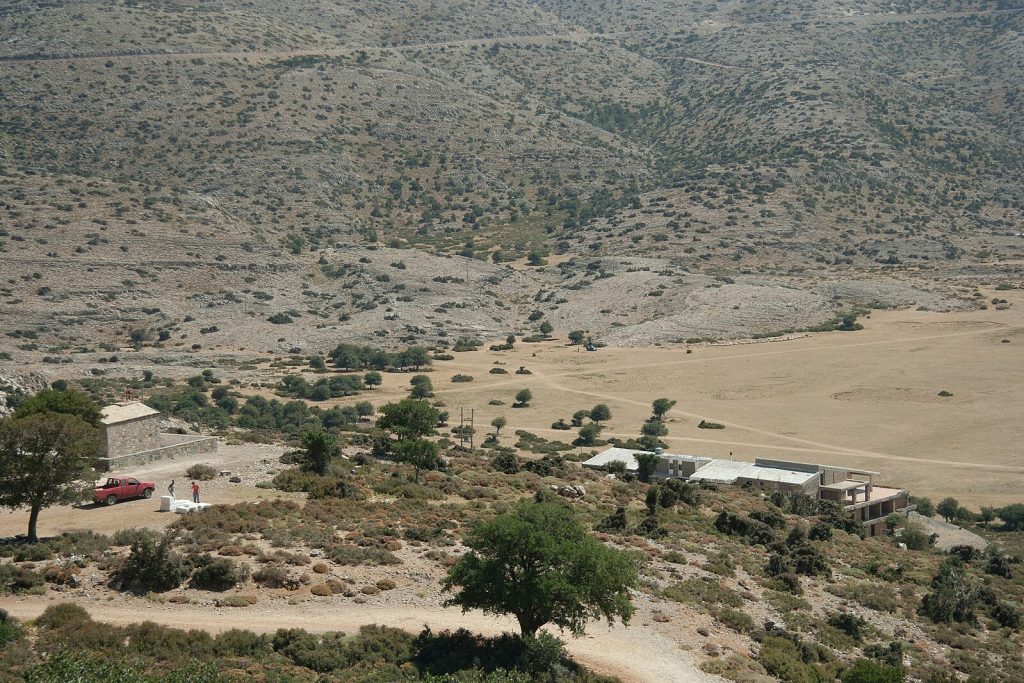

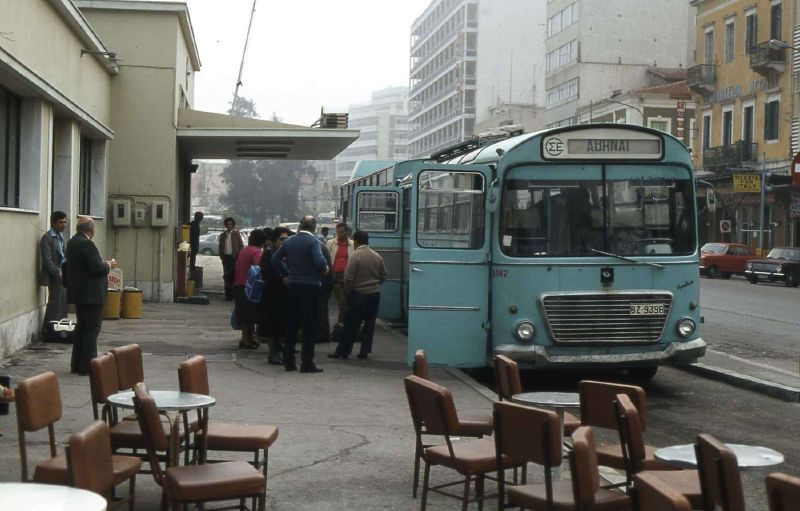
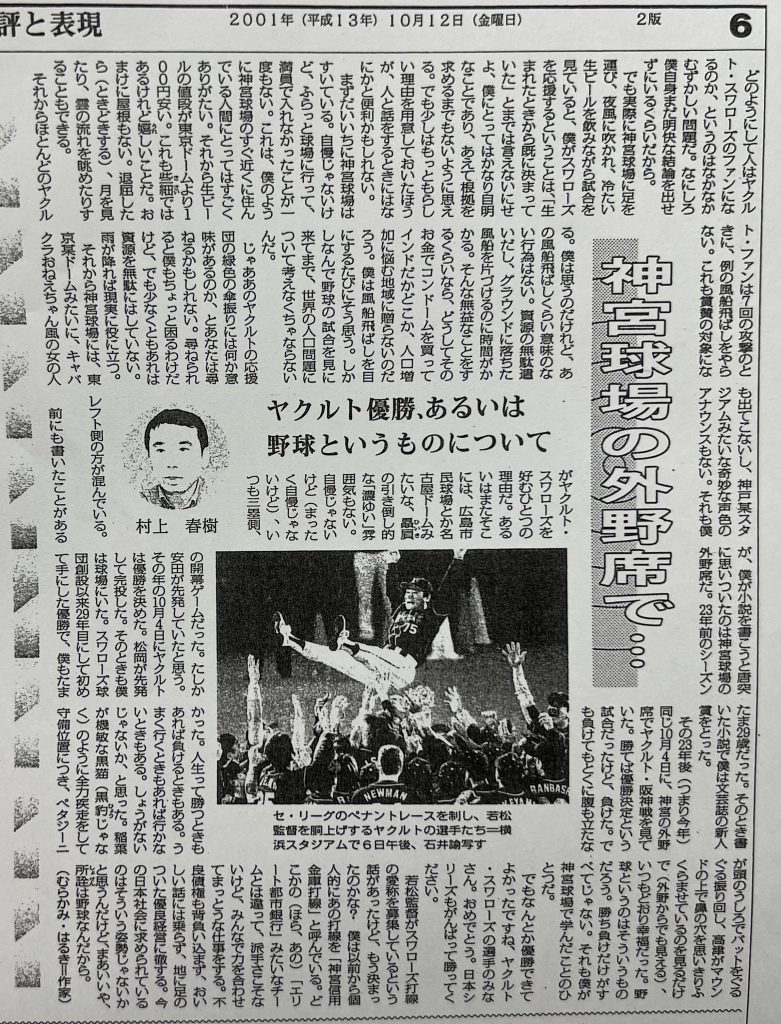
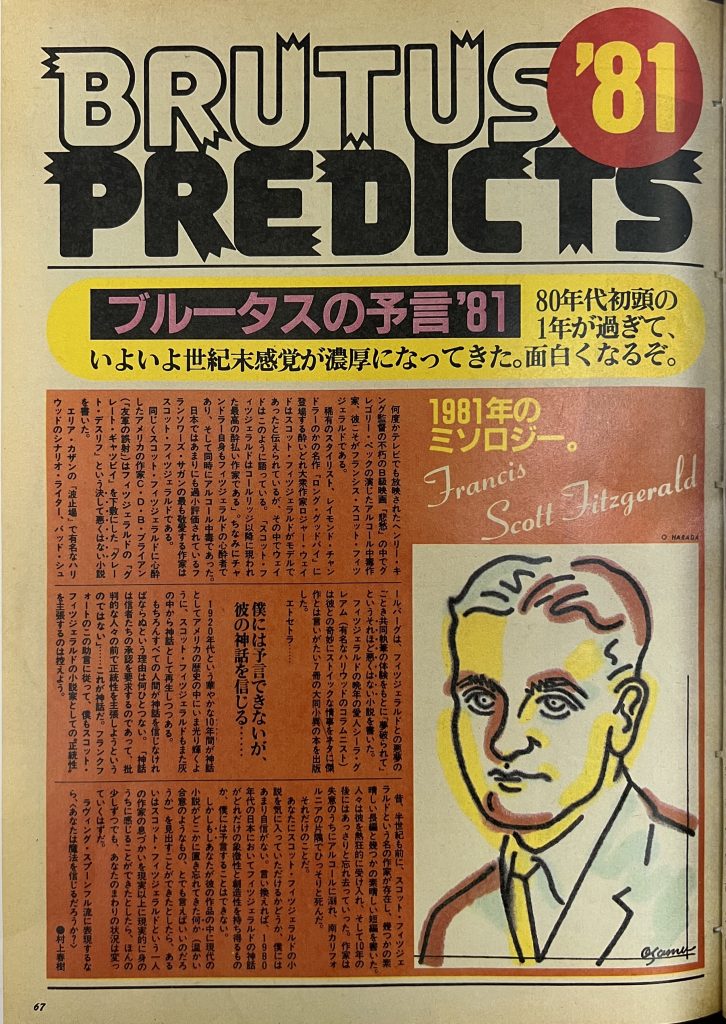
 Rather than pick out one representative, I thought I’d give an overview of each and a few quotes here and there. That feels more helpful to characterize this moment in time. The series as a whole is an interesting look at Murakami early in his career. Before diving in, take a minute to think about the context here. This is Murakami writing a micro-essay in the paper of record (albeit the evening edition) for two weeks straight, six months before A Wild Sheep Chase, his third novel, would be published and draw the attention we saw with the conversation with Itsuki Hiroyuki last week. I imagine the editors had a need to fill word count, but it’s still pretty remarkable.
Rather than pick out one representative, I thought I’d give an overview of each and a few quotes here and there. That feels more helpful to characterize this moment in time. The series as a whole is an interesting look at Murakami early in his career. Before diving in, take a minute to think about the context here. This is Murakami writing a micro-essay in the paper of record (albeit the evening edition) for two weeks straight, six months before A Wild Sheep Chase, his third novel, would be published and draw the attention we saw with the conversation with Itsuki Hiroyuki last week. I imagine the editors had a need to fill word count, but it’s still pretty remarkable.